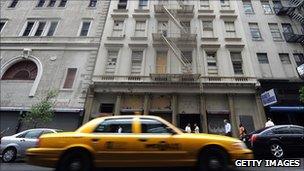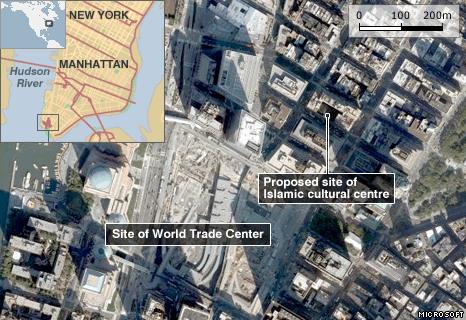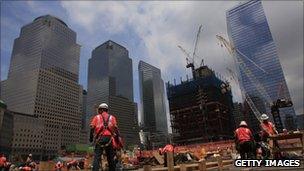The battle over the 'Ground Zero mosque'
- Published

There is currently a makeshift mosque on the site
To its backers it is a chance to boost interfaith relations, but to its opponents, building a mosque near the site of the Twin Towers is unacceptable and they have taken their opposition all the way to the New York Landmarks Preservation Commission.
The "Ground Zero mosque" is several hundred feet from the site where the World Trade Center stood until the events of 11 September 2001.
Its backers plan a 13-storey Islamic cultural centre, including a mosque, on the site of the old Burlington Coat Factory at 45-47 Park Place.
The driving force in the plan is the Cordoba Initiative, external, an organisation which aims "to achieve a tipping point in Muslim-West relations within the next decade, steering the world back to the course of mutual recognition and respect".
But the plan for a mosque so close to where thousands met their deaths at the hands of Islamist militants has provoked controversy.
Former Republican vice-presidential candidate Sarah Palin wrote, external that "to build a mosque at Ground Zero is a stab in the heart of the families of the innocent victims of those horrific attacks".
She called it a "an intolerable mistake on hallowed ground".

Senior Republican Newt Gingrich called it an "act of triumphalism".
Its opponents hope to derail the mosque plan by getting the New York Landmarks Preservation Commission to declare the site a landmark and thus prevent the redevelopment.
But it has long been expected that the commissioners would reject the idea that the building needed to be preserved.
The Anti-Defamation League, a group that tries to stop anti-Semitic attacks, condemned those who had displayed bigotry, external in their opposition to the mosque.
But it went on to state: "The controversy which has emerged regarding the building of an Islamic Center at this location is counterproductive to the healing process. Therefore, under these unique circumstances, we believe the City of New York would be better served if an alternative location could be found."

A new World Trade Center is being built
Relatives of 9/11 victims have come down on both sides of the heated debate.
Mike Burke - whose firefighter brother was killed when the towers collapsed - recently told the BBC: "I think the first concern for the families is that the religious beliefs of the terrorists who struck is going to have such a prominent place right around the corner from Ground Zero.
"This is not an… anti-Muslim effort. It is understandably… emotional for them to be suddenly told that around the corner from where their loved ones were killed they're going to put a mosque."
But another relative of a victim, Charles Wolf, said basic principles had to be honoured.
"The Muslims are not responsible for 9/11. There have been extremists in all religions.
"Denying them the ability to build a mosque… would be like London denying the Roman Catholic Church the opportunity to build a church during the years of the IRA bombings."
New York's mayor, Michael Bloomberg, expressed similar sentiments in an interview with the New York Post, external, saying: "Democracy is stronger than this. You know the ability to practice your religion was one of the real reasons America was founded."
Critics have pointed out that when surveyed, most Americans oppose the mosque, although one poll, external suggested that more people in Manhattan itself supported it than opposed it.
Many of the critics of the plan have insisted they do not oppose the building of new mosques in New York per se, emphasising that it is only the siting of this project near Ground Zero that is "tasteless".
Some have even said the choice of the name Cordoba House could be significant, alluding to the Great Mosque of Cordoba, built on the site of a Spanish church, and turned into a cathedral after the Christian Reconquista.
One of the clerics behind the project, Imam Feisal Rauf, says he hopes the Islamic cultural centre will be a force for good.
"What better place to show that we, as Muslims, condemn the acts of 9/11 than making this stand and making this statement here. When we say it here, we will be heard."
- Published15 July 2010
- Published19 May 2010